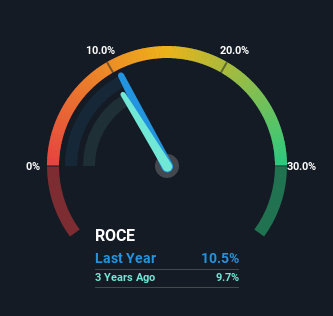- France
- /
- Aerospace & Defense
- /
- ENXTPA:HO
Here's What To Make Of Thales' (EPA:HO) Decelerating Rates Of Return

If we want to find a stock that could multiply over the long term, what are the underlying trends we should look for? One common approach is to try and find a company with returns on capital employed (ROCE) that are increasing, in conjunction with a growing amount of capital employed. Basically this means that a company has profitable initiatives that it can continue to reinvest in, which is a trait of a compounding machine. With that in mind, the ROCE of Thales (EPA:HO) looks decent, right now, so lets see what the trend of returns can tell us.
Return On Capital Employed (ROCE): What Is It?
Just to clarify if you're unsure, ROCE is a metric for evaluating how much pre-tax income (in percentage terms) a company earns on the capital invested in its business. Analysts use this formula to calculate it for Thales:
Return on Capital Employed = Earnings Before Interest and Tax (EBIT) ÷ (Total Assets - Current Liabilities)
0.11 = €1.4b ÷ (€34b - €21b) (Based on the trailing twelve months to December 2022).
So, Thales has an ROCE of 11%. In absolute terms, that's a pretty normal return, and it's somewhat close to the Aerospace & Defense industry average of 9.8%.
Check out our latest analysis for Thales

Above you can see how the current ROCE for Thales compares to its prior returns on capital, but there's only so much you can tell from the past. If you'd like, you can check out the forecasts from the analysts covering Thales here for free.
The Trend Of ROCE
While the current returns on capital are decent, they haven't changed much. Over the past five years, ROCE has remained relatively flat at around 11% and the business has deployed 52% more capital into its operations. Since 11% is a moderate ROCE though, it's good to see a business can continue to reinvest at these decent rates of return. Stable returns in this ballpark can be unexciting, but if they can be maintained over the long run, they often provide nice rewards to shareholders.
On a separate but related note, it's important to know that Thales has a current liabilities to total assets ratio of 60%, which we'd consider pretty high. This can bring about some risks because the company is basically operating with a rather large reliance on its suppliers or other sorts of short-term creditors. While it's not necessarily a bad thing, it can be beneficial if this ratio is lower.
The Bottom Line On Thales' ROCE
The main thing to remember is that Thales has proven its ability to continually reinvest at respectable rates of return. And the stock has followed suit returning a meaningful 51% to shareholders over the last five years. So while investors seem to be recognizing these promising trends, we still believe the stock deserves further research.
One more thing, we've spotted 1 warning sign facing Thales that you might find interesting.
While Thales isn't earning the highest return, check out this free list of companies that are earning high returns on equity with solid balance sheets.
Valuation is complex, but we're here to simplify it.
Discover if Thales might be undervalued or overvalued with our detailed analysis, featuring fair value estimates, potential risks, dividends, insider trades, and its financial condition.
Access Free AnalysisHave feedback on this article? Concerned about the content? Get in touch with us directly. Alternatively, email editorial-team (at) simplywallst.com.
This article by Simply Wall St is general in nature. We provide commentary based on historical data and analyst forecasts only using an unbiased methodology and our articles are not intended to be financial advice. It does not constitute a recommendation to buy or sell any stock, and does not take account of your objectives, or your financial situation. We aim to bring you long-term focused analysis driven by fundamental data. Note that our analysis may not factor in the latest price-sensitive company announcements or qualitative material. Simply Wall St has no position in any stocks mentioned.
About ENXTPA:HO
Thales
Provides various solutions in the defence and security, aerospace and space, digital identity and security, and transport markets worldwide.
High growth potential with adequate balance sheet and pays a dividend.


